HubSpot vs Marketo: Top Marketing Automation Tools
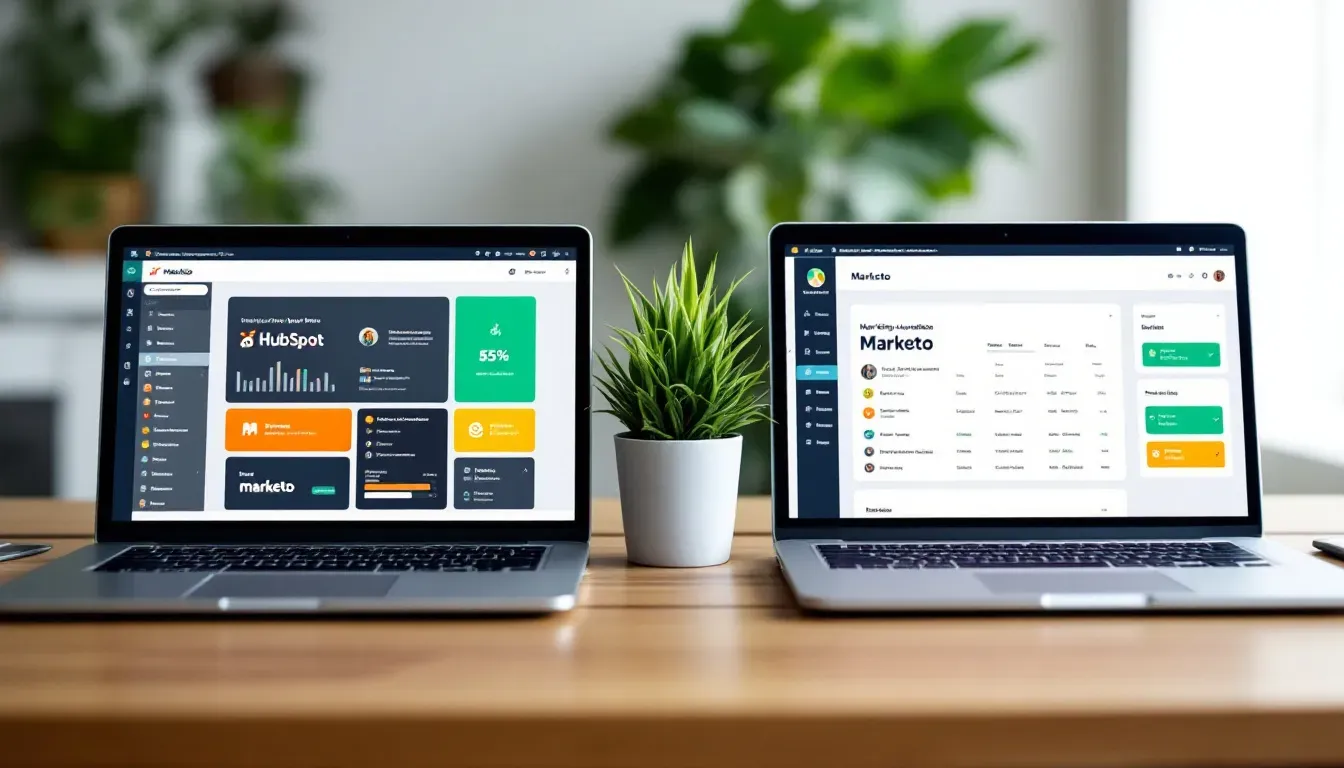
At Drop Cowboy, we often get asked about the best marketing automation tools for businesses. Two giants in this space are HubSpot and Marketo.
In this post, we’ll compare HubSpot vs Marketo, exploring their features, pricing, and ideal use cases. By the end, you’ll have a clear understanding of which platform might be the better fit for your marketing needs.
What Makes HubSpot Stand Out?
Comprehensive Feature Set
HubSpot has established itself as a powerhouse in the marketing automation world. Its all-in-one platform offers a wide array of tools, from email marketing and social media management to SEO tools and content creation capabilities. The seamless integration between these features allows businesses to implement a cohesive marketing strategy.
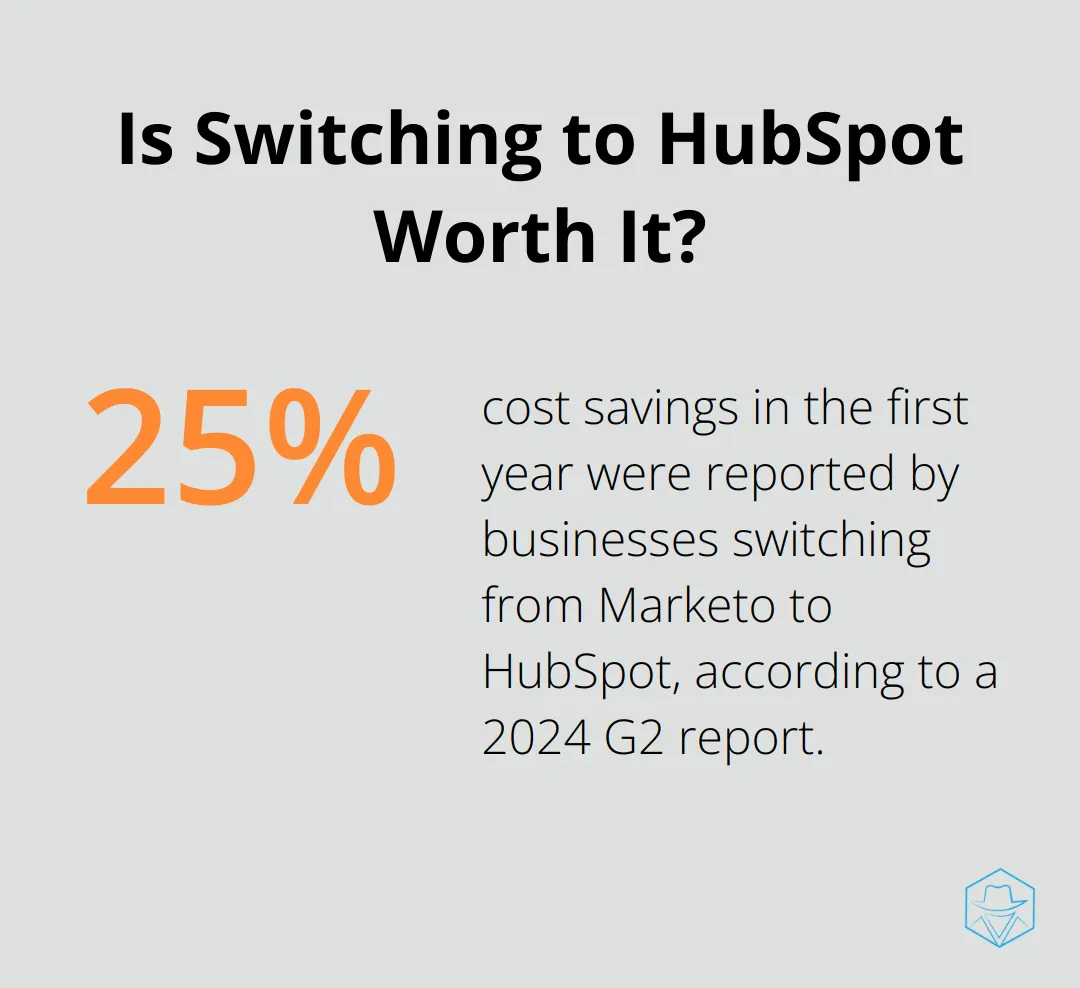
One standout feature is HubSpot’s Smart CRM. This tool provides a unified view of customer interactions across marketing, sales, and service departments. This 360-degree perspective enables businesses to deliver highly personalized experiences at every touchpoint.
User-Friendly Design
HubSpot’s interface stands out for its intuitive design, making it accessible even for those new to marketing automation. The platform’s visual workflow builder exemplifies this user-centric approach, allowing marketers to create complex automation sequences without extensive technical knowledge.
Scalable Pricing Structure
HubSpot’s pricing structure adapts to your business growth. The platform offers a free tier with basic features, making it an attractive option for startups and small businesses. As needs expand, businesses can upgrade to paid plans (starting at $45 per month).
This scalable model sets HubSpot apart from competitors like Marketo, which often requires a significant upfront investment. A 2024 report by G2 found that businesses switching from Marketo to HubSpot reported an average of 25% cost savings in the first year.
Ideal for Growing Businesses
While HubSpot caters to businesses of all sizes, it particularly suits small to medium-sized companies looking to scale their marketing efforts. The platform’s ease of use, combined with its robust feature set, allows growing businesses to implement sophisticated marketing strategies without a large, specialized team.
A Forrester study found that companies using HubSpot’s marketing automation saw an average increase of 451% in qualified leads. This statistic underscores HubSpot’s effectiveness in driving tangible results for growth-focused businesses.
As we explore HubSpot’s strengths, it’s important to consider how these features compare to other platforms in the market. Let’s now turn our attention to Marketo, another major player in the marketing automation space, to see how it stacks up against HubSpot’s offerings.
What Sets Marketo Apart?
Advanced Automation Capabilities
Marketo, now part of Adobe, has established a significant presence in the marketing automation landscape, particularly for larger enterprises with complex marketing needs. The platform’s core strength lies in its sophisticated automation tools. Marketo’s Smart Campaigns feature allows for intricate segmentation and dynamic content creation based on multiple data points. This level of customization enables marketers to craft highly targeted campaigns that resonate with specific audience segments.
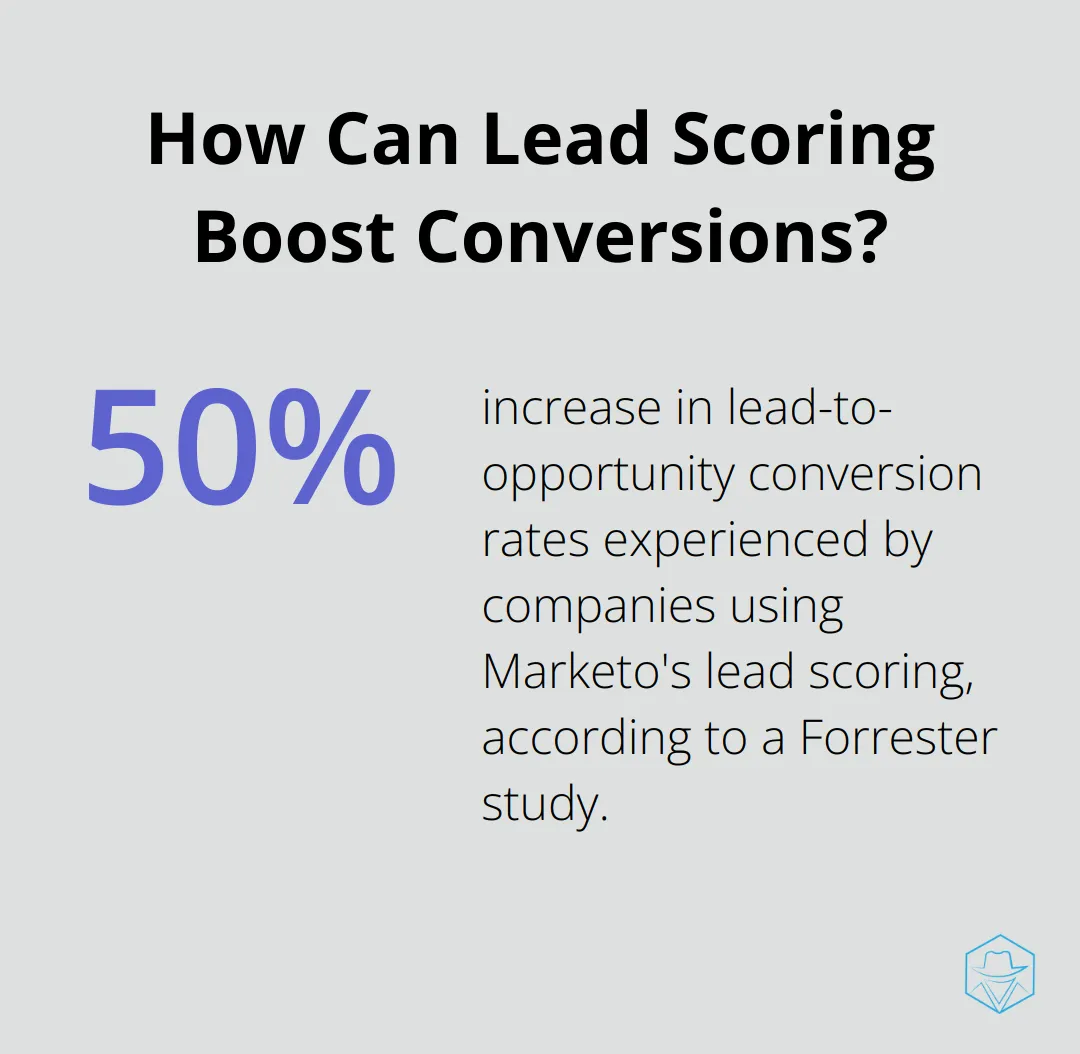
A standout feature is Marketo’s lead scoring system. This tool uses AI-driven algorithms to evaluate and rank leads based on their likelihood to convert, allowing sales teams to focus their efforts on the most promising prospects. A recent study by Forrester revealed that companies using Marketo’s lead scoring experienced a 50% increase in lead-to-opportunity conversion rates.
Enterprise-Grade Analytics
Marketo’s analytics capabilities impress many users. The platform offers deep insights into campaign performance, customer behavior, and ROI. These advanced reporting features prove especially valuable for large organizations that need to justify marketing spend and demonstrate clear results to stakeholders.
Pricing and Cost Considerations
Marketo’s pricing structure targets larger businesses with substantial marketing budgets. While exact prices aren’t publicly disclosed, industry reports suggest that Marketo’s plans start from around $1,000 per month and can exceed $3,000 for more advanced features.
This pricing model reflects Marketo’s positioning as a premium solution for enterprises. However, the total cost of ownership can surpass the base price, factoring in implementation, training, and potential need for dedicated technical resources.
Ideal Customer Profile
Marketo suits large B2B enterprises with complex marketing needs best. Its ability to handle multi-channel campaigns, integration with enterprise CRM systems (like Salesforce), and advanced analytics make it a powerful tool for organizations with dedicated marketing teams and technical resources.
However, smaller businesses or those new to marketing automation might find Marketo’s complexity and cost overwhelming. In such cases, more user-friendly and cost-effective solutions like Drop Cowboy or HubSpot might prove more appropriate.
The next section will provide a detailed comparison between Marketo and HubSpot, helping you determine which platform aligns best with your specific marketing automation needs.
HubSpot vs Marketo: Which Fits Your Needs
User Experience and Learning Curve
HubSpot excels in user-friendliness. Its intuitive interface and visual workflow builder make it accessible for marketers of all skill levels. A 2024 G2 report revealed that 75% of users found HubSpot easier to use compared to Marketo. This ease of use results in faster implementation and reduced training time.
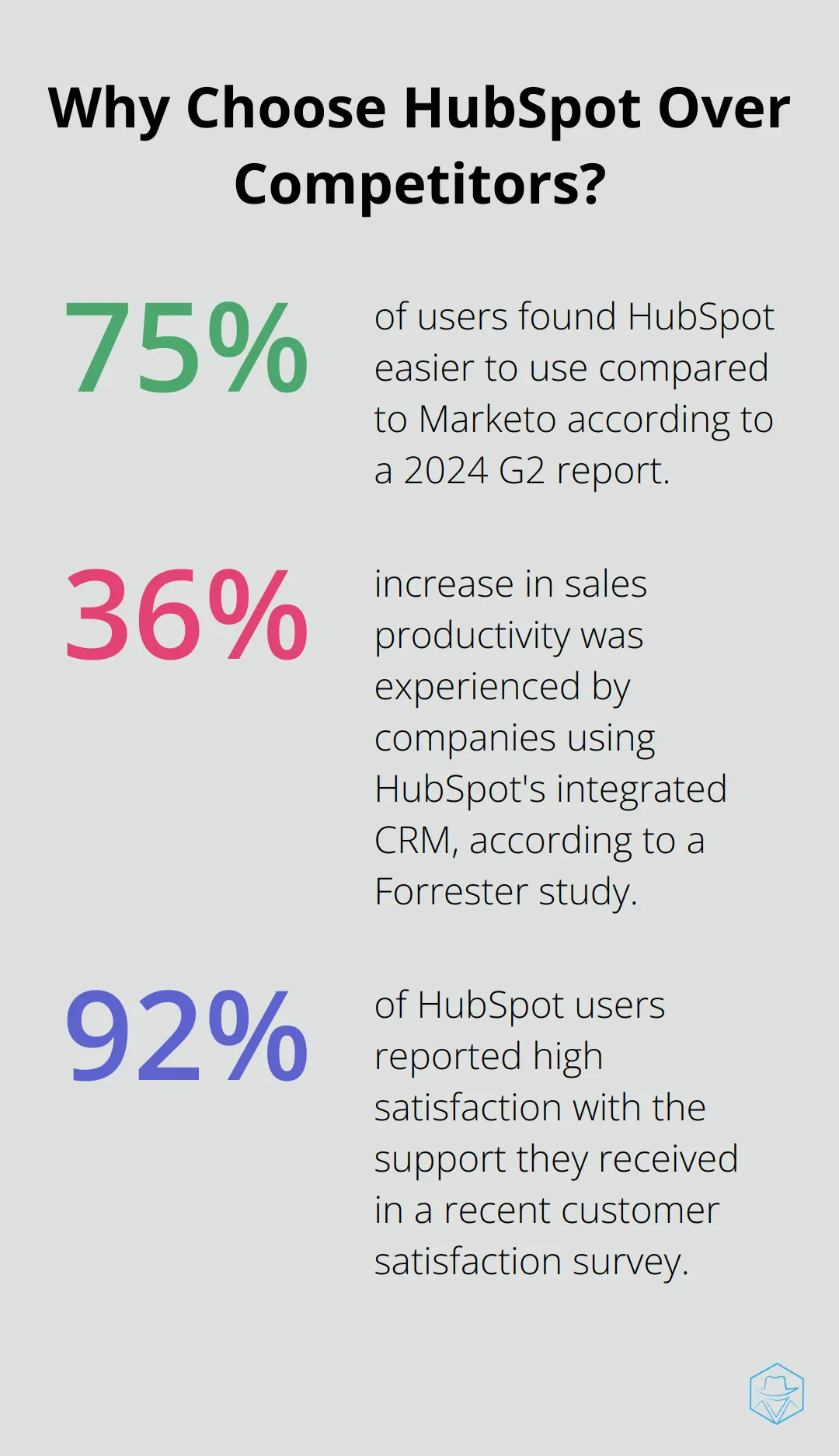
Marketo, while powerful, presents a steeper learning curve. Its complex features often require dedicated technical resources or extensive training. For larger enterprises with specialized teams, this complexity can become an advantage, allowing for more intricate campaign setups.
Automation Capabilities
Both platforms offer robust automation features, but they cater to different needs. HubSpot’s automation tools are more straightforward, making them ideal for small to medium-sized businesses. The platform allows quick setup of email workflows, lead nurturing campaigns, and social media scheduling.
Marketo shines in advanced automation scenarios. Its Smart Campaigns feature enables sophisticated segmentation and personalization based on multiple data points. This level of customization proves particularly valuable for B2B companies with complex sales cycles.
CRM Integration and Sales Alignment
HubSpot’s built-in CRM provides a significant advantage, offering seamless integration between marketing and sales functions. This unified approach allows better lead tracking and smoother handoffs between teams. A Forrester study found that companies using HubSpot’s integrated CRM experienced a 36% increase in sales productivity.
Marketo requires integration with external CRM systems (like Salesforce). While this can benefit enterprises already invested in these systems, it adds a layer of complexity and potential data synchronization issues.
Analytics and Reporting
Marketo offers more advanced analytics capabilities, which can prove essential for large organizations needing detailed insights. Its ability to create custom reports and dashboards is particularly valued by data-driven marketing teams.
HubSpot focuses on making data accessible and actionable for all users. Its reporting features are more user-friendly, allowing marketers to quickly generate and interpret key performance metrics without extensive technical knowledge.
Customer Support and Resources
HubSpot’s customer support receives widespread praise for its responsiveness and accessibility. The platform offers extensive educational resources through HubSpot Academy, making it easier for teams to upskill and maximize the platform’s potential. A recent customer satisfaction survey showed that 92% of HubSpot users reported high satisfaction with the support they received.
Marketo’s support, while comprehensive, often faces criticism for longer response times. However, the platform provides in-depth documentation and a strong user community, which can prove valuable for troubleshooting complex issues.
Final Thoughts
The choice between HubSpot and Marketo depends on your business size, marketing complexity, and available resources. HubSpot offers a user-friendly interface, integrated CRM, and scalable pricing, which appeals to small and medium-sized businesses aiming to expand their marketing efforts. Marketo targets larger enterprises with complex marketing needs, providing advanced automation capabilities and sophisticated analytics (though at a higher cost and with a steeper learning curve).
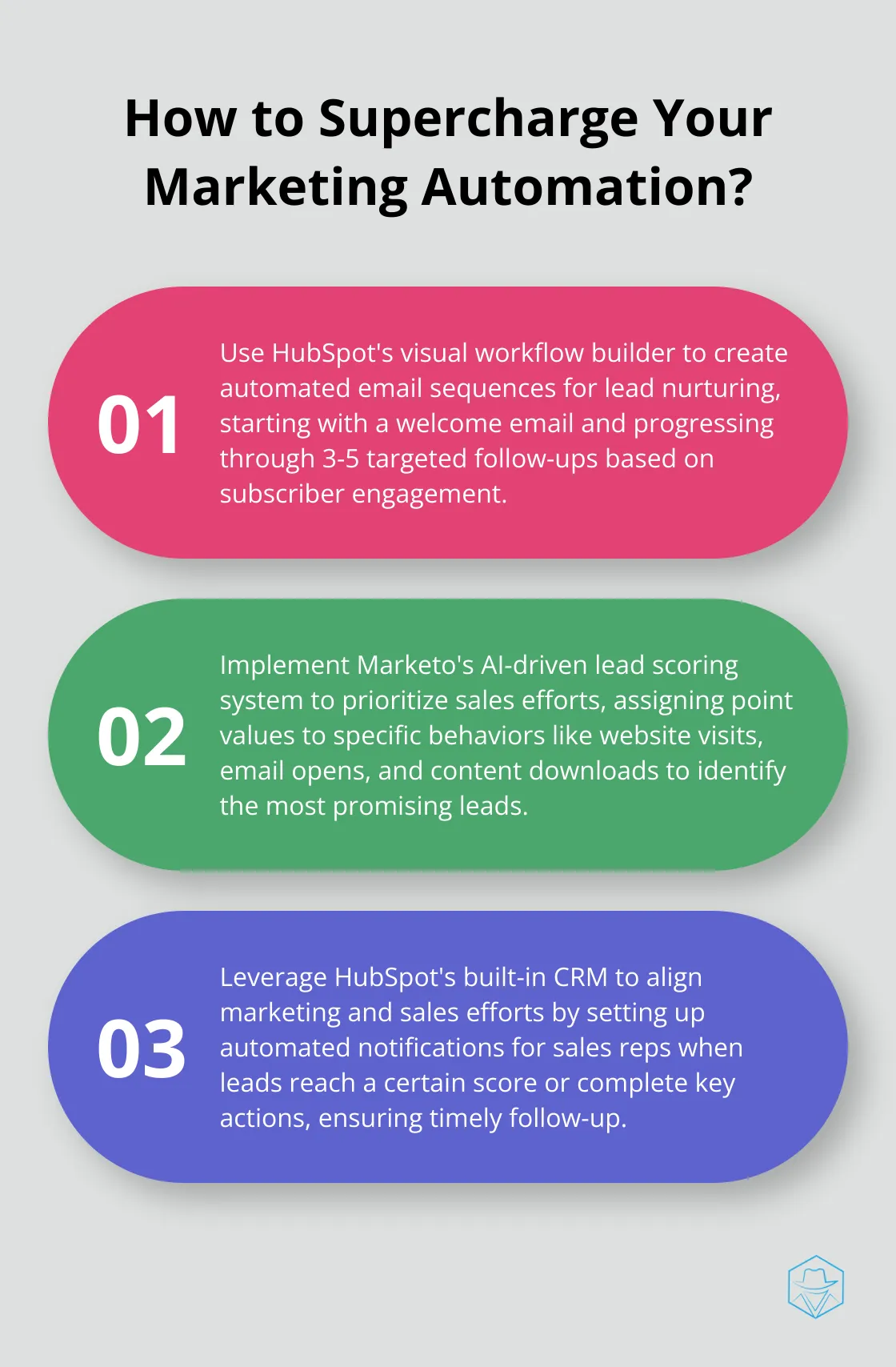
We at Drop Cowboy provide a cutting-edge communication platform that enhances marketing through ringless voicemail and SMS. Our platform includes features like voice cloning, automated campaigns, and global message delivery, all while maintaining a user-friendly interface and cost-effective pricing model. These features complement the capabilities of tools like HubSpot and Marketo, allowing businesses to create more comprehensive marketing strategies.
The HubSpot vs Marketo decision should align with your specific marketing goals, technical capabilities, and budget. We recommend starting with a trial of each platform to experience their interfaces and features firsthand. This hands-on approach will help you determine which tool best supports your current needs and future growth in marketing strategies.
blog-dropcowboy-com
Related posts

May 6, 2025
Hootsuite vs HubSpot: Social Media Management Tools
Compare Hootsuite vs HubSpot for the best social media management tools. Find the features, benefits, and pricing to make an informed decision.

March 13, 2025
Voicemail drops
Explore how voicemail drops can enhance your communication strategy and improve engagement with tips from industry experts.

August 19, 2025
How to Optimize Message Delivery for Maximum Impact
Boost your messaging impact with delivery optimization. Learn practical tips and strategies to enhance reach and engagement effectively.

April 24, 2025
Marketing Automation Consultant: Skills and Expertise
Explore essential skills and expertise of a marketing automation consultant to boost your business with streamlined, data-driven strategies.
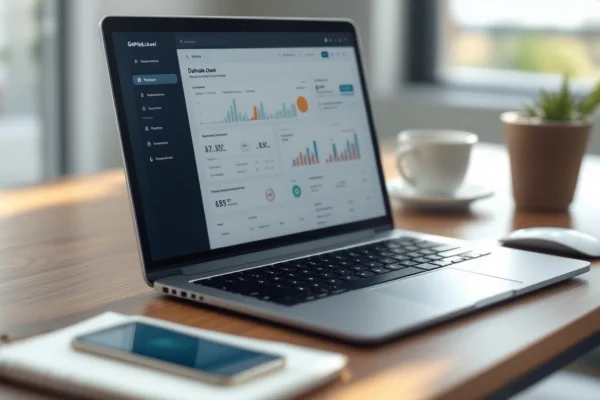
May 15, 2025
Using GoHighLevel to Scale Your Sales and Marketing Workflows
Boost your sales and marketing workflows with GoHighLevel. Explore how to streamline your strategies and achieve growth effectively.

May 29, 2025
Less Annoying CRM: Simplify Your Business Operations
Simplify business operations with Less Annoying CRM. Discover practical tips to streamline, boost productivity, and enhance customer relationships.